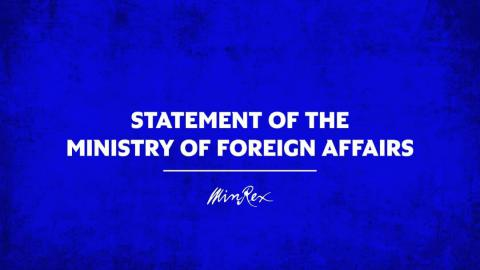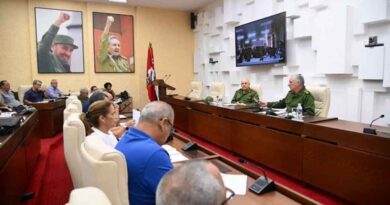Cuba categorically rejects the U.S. Presidential Memorandum tightening the economic blockade
Cuba categorically rejects the U.S. Presidential Memorandum tightening the economic blockade
The anti-Cuban document released by the U.S. government on June 30, 2025, consists of a reissue and amendment of National Security Presidential Memorandum No. 5, which the U.S. government itself issued on June 16, 2017, at the start of Donald Trump’s first term.
Cuba categorically denounces and rejects both versions of the infamous document.
As a clear expression of that country’s aggressive behavior and hegemonic aims, the original text and its current reissue contemplate a set of measures aimed at further strengthening the economic siege and causing greater hardship for the Cuban people, in the failed attempt to take over the country and control its destiny, in accordance with the provisions of the Helms-Burton Act of 1996.
Since 2017, and under the Memorandum issued at that time, the US government began implementing measures to further strengthen the economic blockade, taking it to a qualitatively more damaging level. These measures have been maintained for eight years, including the period of Joseph Biden’s administration, and largely explain the current shortcomings and the significant challenges facing the Cuban economy in its recovery, growth, and development.
The original 2017 Memorandum has been the political platform that promoted, among other measures, the almost absolute ban on U.S. citizens traveling to Cuba. It is the policy that led to the persecution of fuel supplies, the obstruction of remittances, and measures against third-country governments for relying on Cuban medical services to care for their respective populations.
It is also the policy that has pressured commercial and financial entities around the world to impede their relations with Cuba, that has prompted lawsuits in United States courts against investors in our country, and that has led to the slanderous inclusion of the island on the list of alleged state sponsors of terrorism, with its dire consequences for the national economy.
This hostile policy, thus defined, violates international law and numerous UN resolutions. It seeks to justify the use of economic coercion as a weapon of aggression against a sovereign country, with the aim of breaking the political will of the entire nation and subjecting it to the hegemonic dictatorship of the United States. It is not by chance or coincidence that, since 1992, the UN General Assembly has almost unanimously called for an end to the economic, commercial, and financial blockade.
To justify their actions, both the original and the now amended Presidential Memorandum refer to terms such as democracy, human rights, religious freedom, and others. All are concepts incompatible with the historically abusive and transgressive conduct of the US government. It also expressly refers to the determination to destroy socialism and convert the Cuban economy to capitalism.
U.S. leaders and politicians have the audacity to declare that they are acting in this way for the good of the Cuban people.
The challenges facing Cuba are great and daunting, especially given the US determination to destroy the national project that we Cubans have built in the full exercise of our sovereign rights, including the right to self-determination.
The U.S. government doesn’t care that Cuba is a peaceful, stable, supportive country with friendly relations with virtually the entire world. The policy it pursues responds to the narrow interests of a corrupt, anti-Cuban clique that has made attacking its neighbors a way of life and a very lucrative business. (Take from Radio Habana Cuba)



